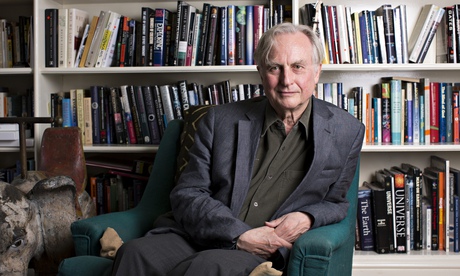Because we count in tens, centennial years get publishers all excited and decennials are the next best thing. You would hardly expect mine to overlook 2016 as the 40th anniversary of The Selfish Gene, 30th of The Blind Watchmaker, 20th of Climbing Mount Improbable and 10th of my biggest seller, The God Delusion.
Of course, counting began with the “digital” aid of fingers, and we still count in tens. The origin of the pentadactyl limb is a mystery lost in the Devonian swamps, where our lobe-finned ancestors crawled out of water. Whatever the reason, we land vertebrates are stuck with five digits per limb (even horses and cattle start with five). Thus physicists use powers of 10 (“orders of magnitude”) to express large numbers with too many noughts for your comfort. If we’d had four digits per limb it might have been a real blessing because octal arithmetic is more binary-friendly than decimal, and computer technology might now be centuries ahead (or at least an octal century of 64 years).
So what, in this personal jubilee year, have I learned about writing, and especially writing about science? Although I largely earn my living by writing, I couldn’t run the equivalent of the course set up by Malcolm Bradbury on how to write a novel. I haven’t thought enough about it. Such principles as I can articulate are almost obvious, though surprisingly neglected. To “put yourself in the position of the reader” requires an empathy, a sensitivity to other minds which can be difficult to train. It’s the phrase I most commonly write in the margin of typescripts that I’m asked to comment on. My own books, by the time they reach publication, have been winnowed through a kind of Darwinian cascade of readings, by me but through the imagined eyes of dozens of others. Automatically, unconsciously, with every reading I find that I’ve inadvertently donned the spectacles of another potential reader, pretty much at random.
Dawkins’s Law of Conservation of Obscurity states that obscurantism in a subject expands to fill the vacuum of its intrinsic simplicity. Academics sometimes language up their writing to conceal how little they have to offer. Francophoneyism – postmodern metatwaddle – is a smokescreen designed, possibly not deliberately, to make shallow authors seem profound. Much of science, by contrast, is genuinely deep, especially the physics of the very small and very large: tough for brains evolved to cope with medium-sized objects moving through the African savannah at well below the speed of light. Far from languaging up, the temptation here is to dumb down. Einstein said we should make it as simple as possible “but no simpler”. If your readers can’t cope with higher mathematics, prose poetry is a good resort. Carl Sagan and Peter Atkins are my personal favourites. Look at this, from Atkins:
Our task should by now be clear. We have to embark upon the track of the absolute zero of creative involvement in the creation … The only faith we need for the journey is the belief that everything can be understood and, ultimately, that there is nothing to explain.
The same book (Creation Revisited) ends gloriously:
We are almost there. Complete knowledge is just within our grasp. Comprehension is moving across the face of the Earth, like the sunrise.
Carl Sagan’s “pale blue dot” soliloquy is often quoted, and if Sagan were still alive, I’d nominate him for the Nobel prize in literature. The availability of other Nobels for science should not rule scientists out for the literature prize, in competition with fiction. Why fiction? What, when you think about it, is so special about things that never happened?
Of my four anniversary books, my favourite is Climbing Mount Improbable. Following on from The Blind Watchmaker it deploys computer models of artificial selection. Darwin introduced natural selection by analogy with the human power to evolve dogs, pigeons and flowers. My computer biomorphs, snails and arthromorphs make selection vivid on the screen in ways that, I like to think, Darwin would appreciate. I had thought those beautiful creatures lost, rendered extinct by the obsolescence of hardware that could run my software. I’m delighted that, in this anniversary year, they have risen, phoenix-like, and now grace the covers of those two books, a uniquely different morph on every jacket.
• Visit Richard Dawkins’s interactive website mountimprobable.com.











